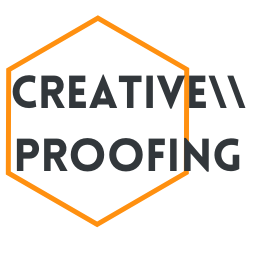I'm Megan J. Robinson, and this is Creative\\Proofing, a space to think, feel, and design out loud. Every Thursday I'll send you a newsletter exploring the intersection of creativity, spirituality, and productivity, and what that looks like for each of us. In each issue of Creative\\Proofing, I’ll dig into various questions, ideas, and topics by sharing what other thinkers, feelers, and doers have said, followed by my take, and then, what it do and what it mean for us going forward. I’ll also try to throw in reader feedback, recommendations, and maybe something I’m enjoying that week. Stick around to find out more, hmmm?
This newsletter is currently ad-free, and just free. (If that changes in the future, I'll be sure to let you know.) You can reach me anytime by replying to this email, and if someone sent this to you, they may be asking you to sign up as well. You can do that by clicking here.
If you'd like to listen, you can also subscribe to the Creative\\Proofing podcast.
Welcome to Your Head
Thinking intelligence is used for retrieving and organizing information. It also helps us plan and analyze.
First, it's helpful to understand that we have three centers of intelligence - our head, our heart, and our body - and we tend to draw from, or rely on, one of those centers more often than the others. Our greatest potential for growth lies in the integration of all three centers, when we engage each intelligence so that they all work together in concert, rather than atrophying from lack of use.
As we recognize the primary center from which we understand, respond to, and interact with our world, we also recognize that we often ignore or distort the other centers of intelligence available to us. Perhaps without realizing it, at some point we told ourselves that something about those other types of knowing was less trustworthy, useful, or valuable. And so, over time, we focused more intently on our dominant center (sort of like weightlifting on only side of the body while leaving the other side alone - looks kinda weird, right?).
This week, we're focusing on the Head Center. We're used to applying (or at least encouraged to apply) logic, common sense, and deliberation to many areas of our lives. We want to make good, competent, beneficial decisions, or at the very least, decisions that cause a minimal amount of harm, to ourselves and others. In a time when data and information lives in the palm of our hand, the difficulty comes in filtering the myriad options, desires, expectations, and boundaries surrounding potential decisions. How do we make the best decisions possible? How do we make wise choices?
We'll take a look at our Head Centers (Intellectual Intelligence, IQ) through the lens of the Enneagram, but rather than delve into the specific types, we'll just go over some general observations that connect the types within each center. We'll also take a quick look at wisdom, which has generally been associated with the head, and what that means for knowing ourselves, others, and our world.
A Quick Note
I work from within the Christian tradition, and understand the Divine as the Trinity of father, son, holy spirit. That said, I know we all have different ways of understanding the Divine, so if you wish to insert [Other] when I use that phrase, please feel free to do so. Understanding ourselves and others through the Enneagram seems to work well either way.
What Others Say
Those who lead from the Head Center spend a lot of time thinking, as you might expect. They trust facts and their own brain power most. These folks draw from their cognitive capacities to assess and analyze the world around them for threats to their well-being, safety, or stability, leading to a propensity to forecast, or plan around potentialities, to ensure their self-preservation. As Chestnut notes, those in this center have a central preoccupation with safety, and manifest that through various expressions of fear. This leads them to stay "in their heads" more often than not, providing dispassionate analysis of interior responses and external circumstances through logical reasoning. They engage the world through observation, mental activity, and planning ahead, and sometimes see EQ (emotional intelligence) folks as somewhat trivial and GQ (gut intelligence) folks as too reactive.
As Christopher Heuertz notes, this emphasis on collecting knowledge is a way to place barriers between themselves and emotional distress; by searching for solutions elsewhere, those who lead from their head hope to avoid navigating the complexities of their inner emotional landscape. Avoiding emotions too often can lead to pain and frustration, and make it difficult to recognize emotions in others. Those in the Head Center may be more prone than most to succumbing to "analysis paralysis," always searching for the best, next, or most correct piece of data to clinch the decision and create momentum. The great temptation for Head Center folks lies in the over-reliance on their mental abilities, and ignoring, distrusting, or outright rejecting knowledge from their other two centers.
But what makes them sometimes hard to connect with via their emotions also makes those who lead from the Head Center wonderful at "gathering, analyzing, and computing information into plans, strategies, and action."* Their ability to collate and synthesize data and think through problems to provide necessary information for the success of a project or event ensures wise choices, careful deliberation, and common benefits for everyone. If creativity is a way of approaching the world and coming up with "new, surprising, valuable" combinations of ideas, our Head Center friends, with their ability to take in information from a wide variety of sources, help us approach the world with curiosity and wonder.
Drew Moser suggests that, in making decisions, what we often lack is "proper understanding, application, and purpose. Consider this:
Information is purely content.
Knowledge is content understood.
Wisdom is understanding applied for what truly matters."
To listen to our heads, whether its our primary center or not, enables us to test various inputs against reality, each other, and our own desires to filter the good from the not-so-great. Frequently, we resort to making expedient, pragmatic, or even ill-advised choices, perhaps because we didn't trust our own instincts, knowledge, or skills. To draw from our Head Center enables us to gain some distance on unconscious motivations, or even slow our roll before rushing to act. To lead with wisdom recognizes that some things actually do require a little more time, while also checking in with our Hearts and Hands to discern how our actions and our connections shape our decisions, and our world. Welcome to your head.
What I Say
If my Heart Center is an overworked muscle (ha!), my Head Center gets the second-best workout. Thoughts and emotions swirl, cycle, and often reinforce one another without pause, leading me to ponder the ol' chicken and egg question: which comes first? Regardless of the answer, I've learned to appreciate my capacity for large amounts of input, recognizing that it's a symptom of my curiosity about the world.
I have often struggled with depression throughout my life, and one of the things I've learned about those ebbs and flows is that, for me, curiosity is a sign of health. When I want to know and understand the world around me, that means I'm coming back to myself. Pairing my knowledge about various topics with my cat-whisker ability to read emotions enables me to listen well and provide thoughtful feedback to others, building valuable connections across a wide network of relationships. I'm pretty chuffed about that, I have to say.
What's It All Mean?
So, to recap, leading with Head Intelligence includes:
possessing a high capacity for analyzing & perceiving information
recognizing a hyper-reliance on dispassionate analysis and rational reasoning
recognizing when it leads to "analysis paralysis"
understanding that anxiety & stress manifest as fear
So, if you or someone else in your life has wanted to gain clarity on personal thinking skills, or making better decisions, well, this takes some time and practice. Usually, if we're frustrated with our decisions, it's because the results of those decisions didn't match up with what we expected to happen. Sometimes those results are easily adjusted, such as returning a wrong size or requesting a redo. Other times, those results backfire a lot more: perhaps a financial investment went awry, or a relationship fell apart.
One tactic I've tried recently focuses on keeping a decision journal: making notes of your thoughts, data, expectations, and later, results, to gauge how well you understood your options at the time, and how the decision turned out. One thing that has especially helped me is to project various scenarios for how this decision could go, ranging from the perfect ideal to absolute shit. I find this so helpful to gain a clearer picture of the consequences I'm willing to deal with, and to pre-feel the less-happy emotions around the outcomes I'd rather not happen. A decision journal provides a way to stay clear on actual options before us, and helps avoid revising history in our favor later, ensuring we don't repeat the same mistakes again.
Here's an article and template from Shane Parrish at Farnham Street about the decision journal, and you can also check out my Notion template that I've adapted for my own use. Let me know how it goes.
Above all, here's what I hope you take away from today:
A Healthy Head Intelligence reminds us to gather and analyze information, trust our cognitive abilities, and cultivate creativity in our decisions.
Creative\\Responses
Got a question, feedback, or something to share? All you have to do is reply to this email and write me! (Be sure to let me know if you want to remain anonymous, or if it's ok to use your first name.)
Creative\\Recommendation
I love learning about deep backgrounds to everyday things, like the ethnography of food, and how recipes came about and become embedded within communities and cultures. Tori Avey does a great job with that, and every single recipe I've ever tried is amaze-balls.
Creative\\Enjoyment
Rediscovering a love for ginger ale, specifically, Canada Dry Zero Sugar Ginger Ale. Hey, it's the little things in life, y'know?
Tell your friends.
If you’d like to support Creative\\Proofing, the best thing to do is spread the word. If you think of five friends who might enjoy this, forward this email to them! Degrees of gratitude may vary, but please know, my gratitude is infinite.
You can share Creative\\Proofing on all the socials. You can also follow on Instagram @R21.5Coaching.
Shalom!





